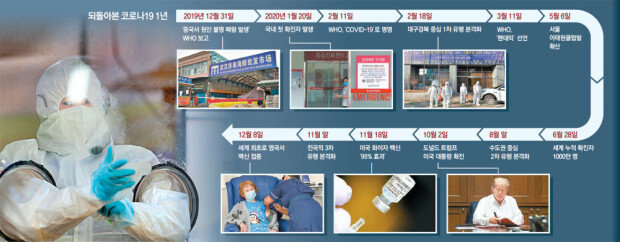Misjudgment fueled the COVID-19 pandemic
Misjudgment fueled the COVID-19 pandemic
Posted December. 31, 2020 07:36,
Updated December. 31, 2020 07:36

1. China’s concealment and mishandling of the virus
Early December last year, patients infected with unidentifiable viral pneumonia began to appear in the city of Wuhan in Hubei Province. China did not immediately report this case to the World Health Organization and waited until Dec 31. China did not block public access to the Wuhan South China Seafood Wholesale Market, which is believed the origin of the COVID-19 pandemic, but instead censored social media to root out related postings. The Chinese government penalized Dr. Lee Wenliang, who issued early warnings about the new disease at the onset of the pandemic.
2. WHO’s belated announcement of COVID-19 as pandemic
The WHO belatedly announced COVID-19 as a pandemic on March 11 only after more than 120,000 cases were confirmed across 114 countries. WTO Director-General Tedros Adhanom Ghebreyesus, who had been backed by China’s support on his nomination, is being severely criticized for the delayed response while being under China’s influence. Meanwhile, U.S. President Donald Trump decided to cut funds to the WHO in April for its mismanagement of the virus and biased stance towards China.
3. Japan’s lax measures to COVID and the Olympics
Japan showed lukewarm measures in responding to COVID-19 since the first half of this year. When a case broke out on a cruise ship in February, the government failed to deal consistently with the situation, having passengers disembark the ship and then quarantining them. It is suspected that the Japanese government had been considering the nation’s hosting of the Tokyo Olympics back then. In March when the pandemic continued to remain prevalent, the IOC and the Japanese government postponed the Olympic games to July 23 next year.
4. Citizens’ distrust towards prevention measures
Despite clear signs of spread in July and August, citizens of top-infected nations did not conform to government measures to prevent the spread of the COVID-19 pandemic. Many people in Spain, Italy, Germany and the U.K. held protests saying that mask enforcement violates individual freedom. Experts say that such protests reflect economic and emotional stress caused by the pandemic and distrust of government’s lack of consistency on COVID-19 measures.
● South Korea’s lukewarm responses to COVID-19
South Korea’s response to COVID-19 gathered global attention, well-known for its effective 3T process: fast testing, trace, and treatment. Its fame, however, has been recently fading off due to its lack of preparation to fend off the third wave of the pandemic and delayed response to secure vaccines. The South Korean government’s policy on closing borders has always been controversial. Opinions remain divided on the government’s recent measures to restrict U.K. arrivals as well as China arrivals earlier this year. Another misguided decision is the government’s making frictions with the medical community in July with the decision to expand the number of medical school quotas at a time when it was too early to predict when the pandemic would end,. The same applies for the vaccine deal as well. President Moon Jae-in belatedly joined efforts to secure additional volume, but COVID-19 vaccination is expected to start in the first quarter of next year at the earliest while some 40 countries around the world have started vaccinations already this year.
jyr0101@donga.com







